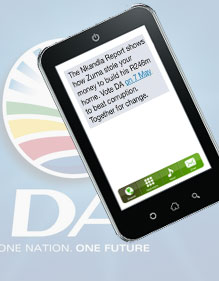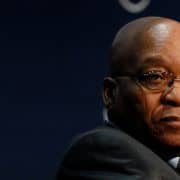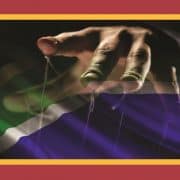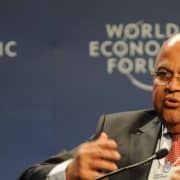|
Getting your Trinity Audio player ready...
|
 The Constitutional Court has ruled in favour of the DA in the matter of a contentious SMS – in which it said that President Jacob Zuma stole taxpayers’ money to refurbish his Nkandla home – sent to Gauteng voters just before national elections in May last year.
The Constitutional Court has ruled in favour of the DA in the matter of a contentious SMS – in which it said that President Jacob Zuma stole taxpayers’ money to refurbish his Nkandla home – sent to Gauteng voters just before national elections in May last year.
The SMS reads: “The Nkandla report shows how Zuma stole your money to build his R246m home. Vote DA on 7 May to beat corruption. Together for change”
The report referred to in the SMS was compiled by public protector Thuli Madonsela. It was completed in 2013, but due to numerous delays was only released in early 2014, with the national elections just around the corner.
In ruling in favour of the DA, the Constitutional Court upheld the party’s appeal against an Electoral Court ruling which found that the SMS was inaccurate. The Constitutional Court also said that the DA did act within its rights when it sent the message. The ANC, on the other hand, stands by its assertion that the contents of the SMS are not true.
Three separate judgments were handed down by the highest court in the land, two of which upheld the DA’s appeal. Seven of the 11 judges agreed, for various reasons, that the Electoral Court’s ruling should be set aside.
Professor Anton Harber, chairperson of the Freedom of Expression Institute (FXI), welcomed the ruling on behalf of his organisation. “It reinforces our belief that political parties must be free to express their opinions of each other, particularly during election campaigns. If citizens are going to be able to make informed voting decisions then there has to be an open and unrestricted flow of information and opinion,” he said.
While Harber expressed his opinion that the DA’s remarks did constitute fair comment in the Nkandla context, and appreciated that there were widespread views for and against that opinion, he clarified that the FXI would “defend anyone’s right to have and share such a view, just as we would defend the right of the president and his party to express strong views on the DA”.
As FXI sees it, the definition of fair comment has to be as wide as possible – this will ensure that there are no restrictions on the ways in which political parties can call each other to account. “We welcome the fact that the court has done this,” Harber said.
Free speech emerges as the winner
Referring extensively to provisions in the Constitution and the Electoral Act on freedom of expression and the right to free and fair elections, the Constitutional Court also made mention of previous relevant cases, and discussed the wording and possible interpretation of the SMS at length.
In the main judgment, Judge Raymond Zondo agreed with the Electoral Court’s ruling. He concluded that the SMS constituted a statement of fact and not comment or an opinion, and stated that “in the result I would dismiss the appeal and make no order as to costs.”
In response to this detail the ANC has claimed that the ruling is not a victory, because the Constitutional Court has confirmed its view that the DA had falsely presented an opinion on the Nkandla report as fact.
“It is regrettable that in spite of the ruling, which supports our view, the DA continues to play politics, hailing this as a victory when the Constitutional Court has been clear that the DA presented their opinions as fact on such an important matter,” ANC spokesman Zizi Kodwa said.
Judges Edwin Cameron, Sisi Khampepe and Johan Froneman, meanwhile, held that: “We embrace the main judgment’s fuller exposition of the facts … but we differ from its conclusion. In our view, the appeal should not fail. It must succeed.”
The three also held that “comments and opinions may be criticised for being unfair or unreasonable, but rarely for being false”.
Judge Johann van der Westhuizen held that the electoral act and code must be interpreted in light of the rights to freedom of expression and to free and fair elections. He disagreed with Cameron’s finding that an opinion cannot be viewed as false information, and determined that the DA’s statement fell somewhere between fact and opinion.
According to Van der Westhuizen, Zuma’s conduct- as described in the Nkandla report – could fit into one of the reasonably possible meanings of the word “stole”, used in the context of an election campaign. He concluded that the SMS cannot be said to contain “false information” as defined by the Electoral Act, or “false allegations” in terms of the electoral code.
“The Electoral Court erred in this regard,” Van der Westhuizen wrote.
In and out of courts
In March 2014, Madonsela released her long-awaited final report on her investigation into allegations of substantial overspending and money mismanagement in security upgrades made to President Jacob Zuma’s private home in Nkandla, KwaZulu-Natal.
With elections just weeks away, the DA wasted no time in sending out the controversial SMS to 1.5-million prospective Gauteng voters, a message which in essence accused the president of theft.
The ANC took exception and brought an application to the South Gauteng High Court, to compel the DA to retract the statement and issue an apology on the ground that it was false information and was intended to influence voters – the alternative was a fine of up to R200 000. On 4 April the ANC’s application was dismissed with costs, and the DA’s message was ruled as fair comment, based on Madonsela’s findings.
But that wasn’t the end of it. The ANC took the matter to the Electoral Court, which ruled on the eve of the elections that the comment should be retracted because it was false, inaccurate and in contravention of the electoral act and code. It was therefore not fair comment. The court ordered the DA to send another SMS retracting the first SMS – it even suggested the wording of the replacement message.
The DA was not about to take that lying down – it promptly appealed the ruling in the Constitutional Court, which has now set aside the ruling of the Electoral Court.









